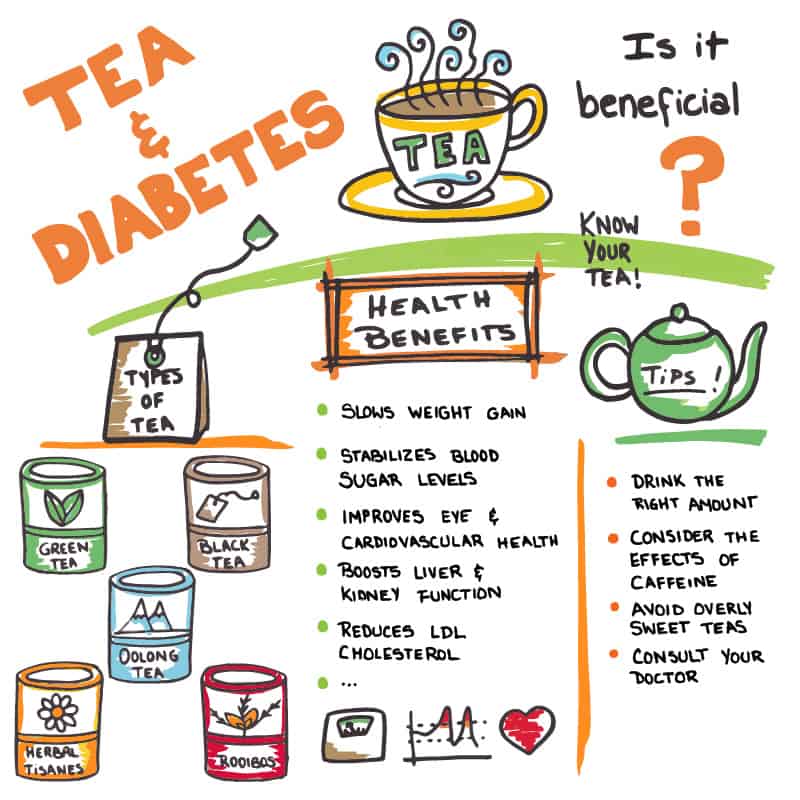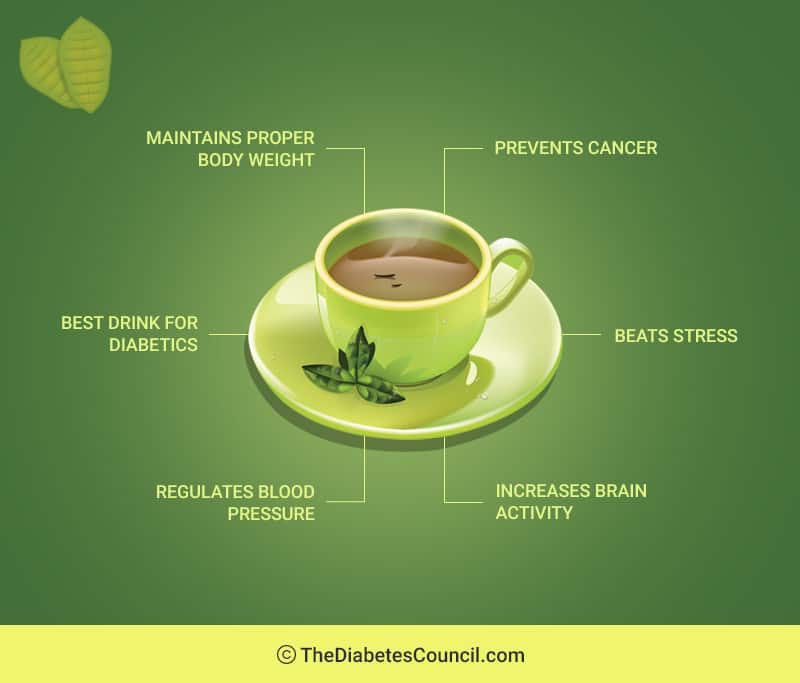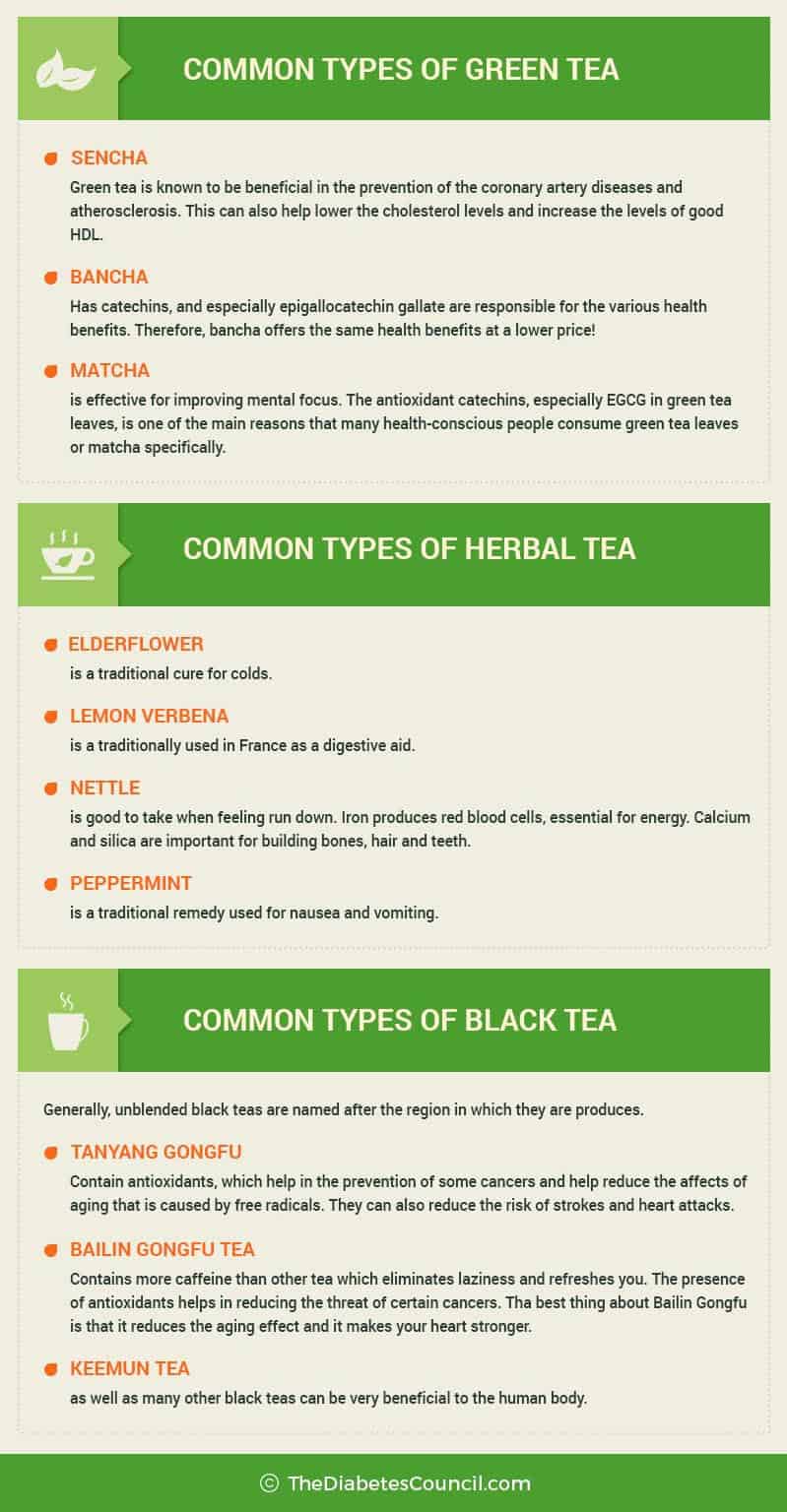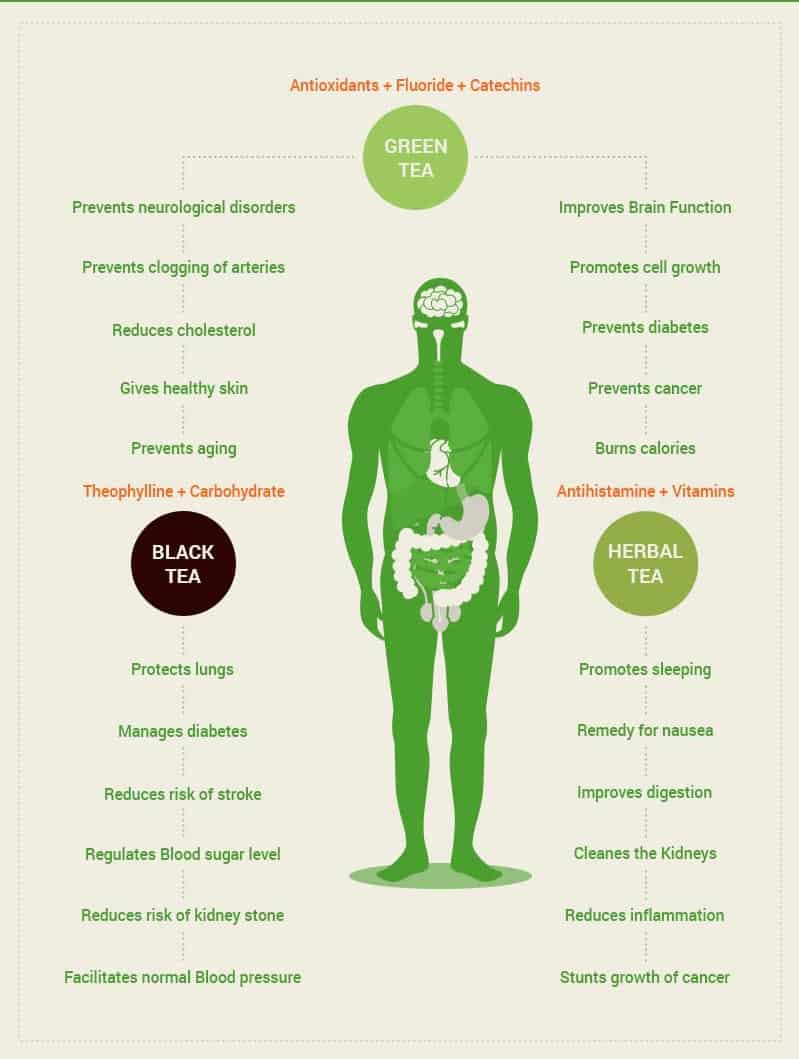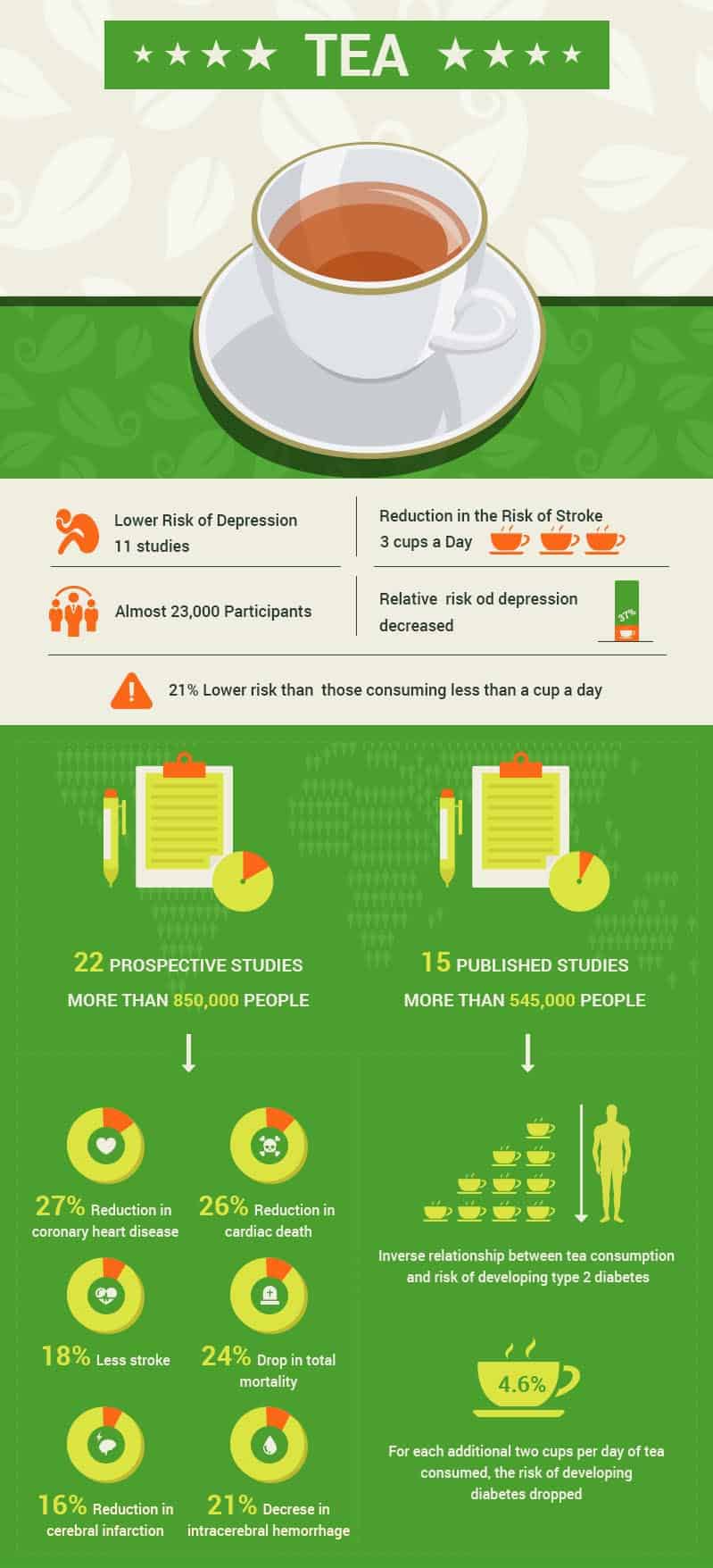When living with diabetes, every food and drink choice becomes a conversation. Deciding what you put in your body can be a daunting task when the consequences of choosing poorly are more extreme than what a person living without diabetes might face. It’s also true that food and drink choices can be some of the simplest, and most empowering, ways for people living with diabetes to manage their condition and its symptoms.
There has been some evidence in recent years that drinking certain teas, in certain quantities, can have a beneficial effect on your health whether you have diabetes or not. For those living with diabetes, tea actually has the potential to do a lot of good. Depending on what type you drink, tea can chemically assist your body with processing and managing sugar and insulin levels, and can also help people manage some of the symptoms of diabetes, including circulation problems, energy levels, blood pressure and more.
Contents
A Little Background on Tea
Tea is a hot or cold beverage consumed by billions of people across the globe daily, with 3 billion tons of tea produced every year for human consumption. There are many varieties of tea; green, white, black, oolong, rooibos, herbal… the list can be long and a bit intimidating, especially when you take into account that many “teas” don’t actually contain the leaves of the tea plant, or camellia sinensis, which is an evergreen shrub native to Asia. Rooibos is made from a bush native to Southern Africa. Herbal teas can contain flowers, leaves, or other parts of a number of different plant varieties, and all of these plants can and do have a different effect on your body.
Given that so many people drink tea of one sort or another on such a regular basis, science has been studying the effect that tea and it’s various chemical compounds has on the human body for decades. Some varieties of tea contain caffeine, which can stimulate your mind but has been linked in certain cases to high blood pressure and other less beneficial effects, which can be especially dangerous when combined with the symptoms of diabetes.
I advise reading the following articles:
As with any dietary or other change, using tea to manage diabetes may not work for everyone. Here are all the facts you’ll need to decide if adding tea to your diet can help you live a longer, healthier life.
Types of Tea and their Properties
Green Tea
Green tea is consumed on a daily basis in dozens of countries worldwide. Unlike black tea, green tea varieties are only minimally processed, and are usually not oxidized at all, which preserves the various chemical compounds and allows them to be processed by the body much easier. Green tea is particularly high in polylphenols, chemical compounds characterized by their antioxidant properties, and their ability to bind with and affect many other compounds.
Medical Properties of Green Tea
What this all means for diabetics has to do with the way the body processes fat. Polyphenols in green tea have been shown to affect the way the body metabolizes food by inhibiting the enzyme amylase, which is primarily responsible for turning carbohydrates into simple sugars (glucose). Green tea has also been shown to inhibit fat from being deposited in your body. Both these factors can help to slow weight gain, and assist your body with processing the food you consume more efficiently. For those with Type II diabetes, green tea can help reduce the sharp peaks in blood sugar that can overload your system with insulin after you eat.
Black Tea
Despite appearances, black tea comes from the same plant as green tea. Unlike green teas, black tea has been oxidized using heat and humidity to change its color, texture, and flavor. Black tea has many of the same properties as green tea, although it contains less caffeine, since the heat involved in its processing serves to break down some of the caffeine molecules (much like darker roasted coffee beans).
Medical Properties of Black Tea
Drinking black tea will help to slow weight gain in the same way as green tea, and contains many of the same polyphenols. Black tea stands apart from green tea in the higher levels of polysaccharides it contains, which is a type of carbohydrate which serves to retard the absorption of glucose, thus directly stabilizing blood sugar levels.
Oolong Tea
Oolong tea is a variety of tea that falls between green and black in terms of processing, color, and properties. It has been oxidized to some degree, more than green tea but less than black. Oolong teas therefore fall in between black and green tea in most other ways, including in its levels of polysaccharides, polyphenols, and caffeine.
Medical Properties of Oolong Tea
Oolong tea specifically has been shown to lower plasma glucose levels, but it’s important to note that the area that a tea is sourced from can have a dramatic effect on its chemical composition, because of variations in strain and processing methods from country to country, or even region to region.
Rooibos Tea
Rooibos is often labeled tea by sellers because it is brewed using hot water in much the same way as “real” tea. However, rooibos comes from a different plant entirely, the Aspalathus linearis bush native to southern Africa. Sometimes called bush tea, rooibos makes a very mild tasting drink with little to no bitterness, owing to its lack of tannins, and contains no caffeine.
Medical Properties of Rooibos Tea
The health properties of rooibos are owed mainly to similar antioxidants as those found in black and green tea. Several tests on rats using rooibos found that the rodents which consumed the beverage showed improvement in eye and vascular health, two areas which can be adversely affected by the side effects of type II diabetes.
Herbal Tisanes
Any beverage which has been brewed with hot water from plant materials, and which does not contain tea, is more properly called a tisane, but like rooibos, many herbal tisanes are marketed as teas for ease of identification. There are dozens if not hundreds of herbal teas sold, especially with the rise in holistic and food-based medical practice in the last few decades, and each can contain any number of different plant materials, and are touted to have a variety of effects on the health of the drinker.
Further reading:
Medical Properties of Herbal Tisanes
For those living with type II diabetes, bilberry (or huckleberry) tea, can reduce glucose levels naturally, and coriander tea (or a blend containing coriander) will help boost liver and kidney function. Additionally, both these teas can reduce LDL cholesterol, which promotes healthier circulatory function.
However, it is especially important to consult your doctor before adding herbal tisanes to your diet, as a number of plants used in herbal teas can have interactions or negative side effects, depending on your overall health. Sage tea has been shown to trigger epileptic episodes in those with seizure disorders, for instance. Always consult a medical professional even when using supporting or alternative medicine.
So What About Tea and Diabetes?
There has been some evidence in recent years that drinking certain teas, in certain quantities, can have a beneficial effect on your health whether you have diabetes or not. However, for those living with diabetes here are a list of things to consider when it comes to adding tea to your diet.
- Drinking the right amount
Depending on what type of tea you are consuming, your personal health factors, and other concerns such as high blood pressure or high cholesterol, the amount of tea you might choose to add to your diet can vary greatly. Green, black, and oolong teas all contain caffeine, with green having the most and black having the least. In order to see the health effects of tea in your life, studies suggest you should consume as much as 4.5 8-oz. cups of black or green tea a day, which can introduce a large amount of caffeine into your diet, in addition to the sugar busting and circulation boosting properties you may be looking for. As always, it is smart to consult your doctor before making any major changes to your diet.
- Tea and Caffeine
As stated, black, oolong, and green teas all contain caffeine. There are many studies which have shown inconclusive or contradictory results on the subject of caffeine and diabetes. Some studies show that individuals who consume large amounts of coffee are far less likely to develop diabetes, but studies also show that for those who have been diagnosed with diabetes, the consumption of caffeine can introduce a short-term but dramatic increase in insulin resistance, which would make it difficult to accurately manage blood sugar levels. However, a longitudinal review of these studies suggests that the carbohydrates are an equal if not greater culprit in these findings, and that a low-carb diet could help mitigate the negative effects of caffeine while preserving its beneficial effect on blood glucose levels.
- Tea and Sweeteners
Of course when consuming all this tea, it is important to realize that it’s best to avoid overly sweet teas, whether hot or iced. Many commercially sold bottled teas will contain sugar, even if they claim to be unsweetened, and given the large volume of tea you may need to consume to see health benefits, this can add a huge amount of sugar to your diet, which any diabetic will tell you is a bad idea. In order to properly monitor your sugar intake, it’s a good idea to avoid buying pre-brewed teas and instead make your own.
In Conclusion
Tea has the potential to assist you in your efforts to manage your diabetes, especially for those with type 2 diabetes. However, tea has many properties that can affect how it affects you, depending on other factors which can vary widely from person to person. For any decision you make concerning your health, involve your doctor in the conversation, and with some guidance and a little trial and error, you may discover that tea can and does improve quality of life for those living with diabetes. Hopefully this article has given you the information you need to figure out if adding tea to your diet will help you live a longer, happier life!
References
TheDiabetesCouncil Article | Reviewed by Dr. Jerry Ramos MD on June 01, 2020


